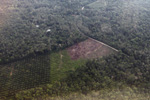The tragic earthquake and tsunami that hit Japan last month is likely to boost wood imports into the recovering nation, adding increased pressure on the already imperiled rainforests of Southeast Asia. Even before the disaster, Japan was the world’s number one importer of wood chips and plywood and the second largest importer of logs. Japan usually imports plywood from China, Malaysia, and Indonesia, however the forests of Southeast Asia are facing tremendous loss due to logging and clearing for industrial-scale agriculture, such as palm oil.
According to a press release from Wood Resources International LLC, the Japanese government has already requested 30,000 prefab temporary houses for disaster victims over the next two months. Demand for imports is expected to increase once infrastructure has been repaired and power restored.
“Over the next 6-12 month, it can be expected that there will be a rise in demand for both lumber and plywood. This will result in increased importation of processed products and of logs to supply domestic Japanese mills,” reads the press release from Wood Resources International LLC.
A recent article from the Borneo Post largely agreed.
“One timber player rules out a ’30-40 per cent jump in exports’ to Japan – which mostly buys plywood from Malaysia – but expects a probable steady rise in demand from Japan to help in the reconstruction process, depending on the extent of the damage to buildings,” AmResearch, an investment research firm based in Kuala Lampur, Malaysia, told the Borneo Post.
Both Malaysia and Indonesia have become targets of conservation and environmental groups for their deforestation rates. According to the UN Food and Agriculture Organization (FAO) Malaysia lost 140,200 hectares of forest every year from 2000-2005, while Indonesia lost 485,000 hectares of forest annually during the same period of time. However, other studies have found even higher rates of forest loss in Indonesia. Deforestation in the region produces vast greenhouse gas emissions, threatens thousands of species, and produces conflict with local and indigenous people over land.
Related articles
5 million hectares of Papua New Guinea forests handed to foreign corporations

(03/23/2011) During a meeting in March 2011 twenty-six experts—from biologists to social scientists to NGO staff—crafted a statement calling on the Papua New Guinea government to stop granting Special Agricultural and Business Leases. According to the group, these leases, or SABLs as they are know, circumvent Papua New Guinea’s strong community land rights laws and imperil some of the world’s most intact rainforests. To date 5.6 million hectares (13.8 million acres) of forest have been leased under SABLs, an area larger than all of Costa Rica. “Papua New Guinea is among the most biologically and culturally diverse nations on Earth. [The country’s] remarkable diversity of cultural groups rely intimately on their traditional lands and forests in order to meet their needs for farming plots, forest goods, wild game, traditional and religious sites, and many other goods and services,” reads the statement, dubbed the Cairns Declaration. However, according to the declaration all of this is threatened by the Papua New Guinea government using SABLs to grant large sections of land without going through the proper channels.
Controversial logging company seeks to raise $450 million in China
(03/21/2011) Asia Pulp & Paper (China) Investment aims to raise up to 3 billion renminbi ($457 million) through a bond issue, reports IFR Asia.
Pulp and paper firms urged to save 1.2M ha of forest slated for clearing in Indonesia

(03/17/2011) Indonesian environmental groups launched a urgent plea urging the country’s two largest pulp and paper companies not to clear 800,000 hectares of forest and peatland in their concessions in Sumatra. Eyes on the Forest, a coalition of Indonesian NGOs, released maps showing that Asia Pulp and Paper (APP) and Asia Pacific Resources International Limited (APRIL) control blocks of land representing 31 percent of the remaining forest in the province of Riau, one of Sumatra’s most forested provinces. Much of the forest lies on deep peat, which releases large of amount of carbon when drained and cleared for timber plantations.